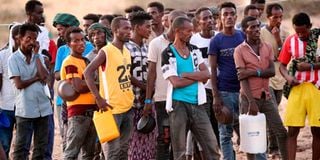Premium
UN condemns claims of bias against aid workers in Tigray

Ethiopian refugees who fled the war in Tigray. A senior UN official on August 3, 2021 condemned as "dangerous" accusations by Ethiopian government officials that aid workers were biased in favour of rebel forces in Tigray.
Addis Ababa
A senior UN official on Tuesday condemned as "dangerous" accusations by Ethiopian government officials that aid workers were biased in favour of — and even arming — rebel forces in war-hit Tigray.
"Blanket accusations of humanitarian aid workers need to stop," UN humanitarian chief Martin Griffiths said at a press conference at the end of a six-day visit to Ethiopia, his first mission in his new role.
"They are unfair, they are unconstructive, they need to be backed up by evidence if there is any and, frankly, it's dangerous."
At least a dozen aid workers have been killed since Prime Minister Abiy Ahmed sent troops into the northern region of Tigray in November to topple its ruling party, the Tigray People's Liberation Front (TPLF).
The 2019 Nobel Peace Prize winner has said the move was in response to TPLF attacks on army camps.
Stunning turn
Though he vowed victory would be swift, the war took a stunning turn in late June when pro-TPLF forces retook the regional capital Mekele and the federal army largely withdrew.
Fighting has since spread to the Afar and Amhara regions, which border Tigray.
In mid-July a senior government official, Redwan Hussein, accused some aid groups of "arming the other side", meaning the TPLF, but gave no details.
Aid workers have complained that, even though Abiy declared a humanitarian ceasefire in late June, aid access in Tigray is as bad as ever, hobbled by insecurity and bureaucratic hurdles.
Griffiths on Tuesday reiterated the UN's estimate that 100 aid trucks need to reach the region each day to meet the demand on the ground, where the UN has said hundreds of thousands of people are suffering from famine.
"To make this work we need to change the circumstances that have seen trucks moving in rather slowly," he said.
"We need assured access routes by land as well as, of course, our own flights going in and out of Mekele. And frankly we need the war to end."





